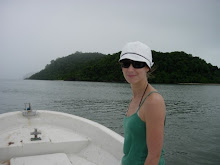About Me

- Aly Boyce
- Hi. I am a BLM student at CQ University. The purpose of this blog is to record my ideas and discoveries as I play with new technological tools that may be used in the classroom.
Saturday, July 10, 2010
Website
Wiki
Today I set up my first Wiki site, using wikispaces.com. Until Thursday, I had never even heard of a 'wiki', besides 'wikipedia'. Basically, Wiki is a space where a community - large or small, public or private - may posting new ideas on the one topic and editing existing posts to come up with a more refined product. Unlike blogs, which everyone can read, but noone may edit, a Wiki can be viewed by all and edited by others also. What an amazing classroom tool!!!!
As a student I can count a dozen times where this tool would have been helpful in my studies so far. By using Wiki we would have eliminated the need to send group emails back and forth, wasting time reading over the same things and duplicate ideas. When organising events and assignments through group emailing, the task is almost always pushed forward by the most organised person who doesn't mind re-organising information and sending it back in a collated form. The Wiki would save this person so much time as there is no need for one person to be the organiser. With wiki the responsibility is on the GROUP.
There have been many changes in education over the years. Before the industrialized era where education became print based, people were educated aurally (Ferris & Wilder, 2008). Oral culture had the strength of being based in community and people had group ownership of knowledge. The introduction of print based education moved education from a community focus to an individual act. Print also meant information was not from the 'now'. Instead, the printing of information meant education could become stagnant and outdated. Ferris and Wilder (2008) talk about the era of education called, "secondary orality," where technology allows education to take the best of both print and oral methods of acquiring knowledge.
I absolutely see the benefit of Wikis in the classroom. Wiki technology reintroduces the focus on group/community and encourages participation. In a class setting, it benefits the students, but also the teacher who can easily monitor who has been contributing to tasks by looking at the log of edits, and can contribute clues if groups are off task, or have inaccurate information.
Learning styles quiz
My task at University this term is to test different digital tools that can be used in the classroom to enhance learning. The idea is that, by including technology effectively into lessons, all students, with varying learning styles and experiences, can be better catered for more effectively than when traditional teaching methods are employed.
I continue to be in two minds about technology in the classroom. Just because the students are more technology savvy these days, and prefer playing computer games than reading a book, does that mean we should continue to encourage their tendencies, or is it our job as teachers to give them a taste of the 'traditional' (books, paper and pen, sedning letters in the post etc) to balance their technology-saturated lives? I am still unsure where I sit on this issue. Does technology really 'enhance' the learning environment?
Well, this is the question I will endeavor to answer during this course.
But before I begin poking, prodding and critiquing as many available technologies for the classroom as I can, I must start by looking at myself. Who am I, as a learner? How do I best work?
I pop onto a learning styles website (www.learning-styles-online.com) to find out more...

Blogs for the classroom?
When asked how blogs could be useful in a teaching context, I began to think about blogs of friends - cooks, photographers, travelers - and how they used their blogs to address certain needs in their specific contexts. Travel blogs were used to keep family and friends up to date with travels, cooking blogs helped establish a cyber-community of people who share the same passion and want to swap techniques/recipes, and journal-like blogs could be used as a tool for reflections on professional experiences.
It seems that all of the above needs are also needs of teachers. Teacher blogs can help establish cyber-communities where resources and ideas can be shared, and journeys of particular teachers that interest you can be followed. Through the actual writing of the blog, teachers are also able to consider and reflect on their practice and their own learning journey. In this way, I think blogs definitely have a place in teachers lives.
But what about the students?
As far as I can see, blogs may also provide students with a platform in which they can reflect on their own learning experiences, and share these with classmates, locally and globally. The blog may serve as a way for students to meet other students doing similar topics, etc, all over the world. The issue to be considered here, though, is privacy. Blogs pose serious risks for some students who do not wish for their identity to be made public. It would be difficult to ensure all students are writing blogs, maintaining 'netiquette' standards and ensuring all classmates identities remained anonymous.
It seems to me that blogs are a great tool for teachers, but perhaps a private forum within the classroom or school community would be more appropriate for students to use.
Mind Mapping
.jpg)